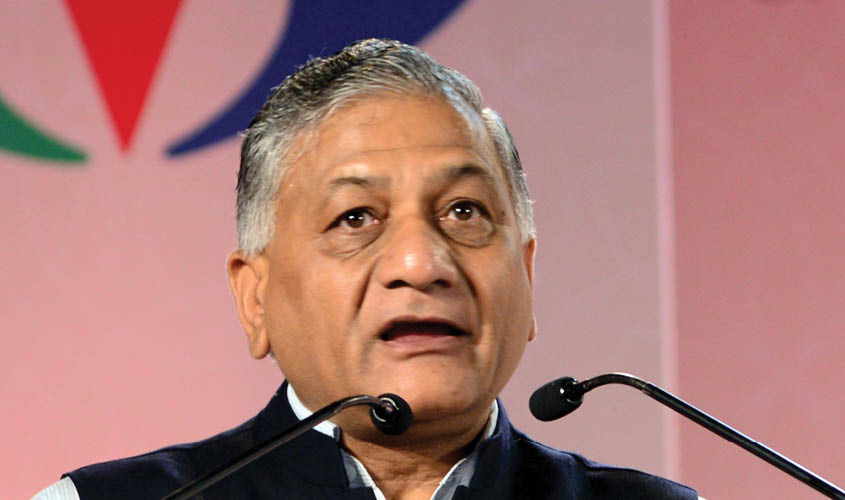New Delhi: At least 10 covert operations outside India were carried out by a tiny specialised unit of the Indian Army, the Technical Service Division (TSD), which was formed in May 2010 after General V.K. Singh took over as Chief of Army Staff. These included operations that prevented 26/11 Mumbai-type attacks of 2008 from taking place. However, once Gen Singh retired in May 2012, the TSD was disbanded after being portrayed as “rogue” by several media reports that were based on so-called information leaked allegedly from the laptops and pen-drives of serving Army officers. There was intelligence that external forces inimical to India’s interests were attempting the shutting down of this unit, according to Gen Singh.
Gen V.K. Singh, who is now a Minister of State in the NDA government, had pointed out in a letter to the then UPA Ministry of Home Affairs in 2013 that the winding up of the TSD had resulted in the Army being “left with no covert operation and weak counter-insurgency capacity”, thus resulting in an increase in cross-border terrorism.
Though the details regarding what the division achieved in less than 24 months of its existence was never made public, sources who were familiar with its working revealed that the details of its operations, if made public, would wash away the ignominy of it being a “rogue” unit, which was tagged to it in the last few months of its existence.
The TSD was engaged in carrying out covert operations outside India which involved gathering intelligence based on technical and human intervention, acting on those intelligence inputs and taking pre-emptive measures and conducting strikes of retribution against the entities that were engaged in anti-India operations.
The unit was brought into existence after the failure on the part of the agencies to get advance intelligence on the 26/11 Mumbai attack.
A section within the Army leadership, encouraged by the office of the National Security Advisor, felt that the Army too should have the capability to carry out limited, covert strikes outside the country to prevent any such further attacks.
The unit, when it was functioning to its full capacity, comprised at least six officers, five JCOs and 30 men who were working from a two-storied building in the Delhi Cantonment area and was reporting directly to Gen V.K. Singh.
When The Sunday Guardian contacted some of the officers who were a part of the division or played a part in its formation, they were not ready to disclose any information about the unit.
After his retirement, on 13 November 2013, Gen Singh wrote a letter to then Union Home Minister Sushil Kumar Shinde seeking action against government servants, defence officials and some private individuals for leaking information about the existence of the division and maligning it, which ultimately led to it being disbanded.
The letter reads: “The Indian Army had a unit called the Technical Service Division (TSD). It was set up to accomplish covert operations in other countries. It was a very important wing because it was the only unit which could perform this task. Given the nature of the work, the whole unit worked in a secretive and ‘camouflaged manner’. TSD is a covert operation agency, activities of which are directly related to the safety of the soldiers fighting on the borders, retribution on the enemy and the security of the citizens. By its very nature TSD operation was ‘top secret’. In that event, even the existence of TSD should never have been publicised. Further, if there is exposure of the actual working of the top-secret unit, leaking information about it could be treacherous, regardless of whether information is true or not.”
Yet, information about it was leaked to the media, which went to town painting it as a “rogue” agency riddled with “irregularities”.
Gen Singh also mentioned in the same letter that “there was an intelligence report which clearly warned that a few anti-national elements are conspiring to defame TSD by leveling false allegations and giving wide media coverage on the issue as the name of the unit has already been tarnished on several occasions. As a consequence of these acts prejudicial to the defence of India and the security of the State, TSD has been wound up and Indian Army is left with no covert operation and weak counter-insurgency capacity.”
“It is widely believed that if TSD had not wound up, the recent Samba attack by Pakistan-based elements (wherein several soldiers including a Lt. Col. were killed) could have been avoided. There is also widespread belief among senior Army officers that the scrapping of the TSD is a major reason why there has been a spurt in cross-border intrusions over the past year leading to the death of several soldiers and civilians,” Gen Singh had added in the letter.
When approached by this newspaper to confirm whether he had received the letter and if any action was taken on the basis of it, Shinde sounded evasive. “I don’t know… I don’t know. If at all he had any complaint, he should have come personally and met me at that time,” he said, adding that he later saw the letter. However, he ended the conversation commenting that “No General can write to the Minister in that language in which the letter was written.”

